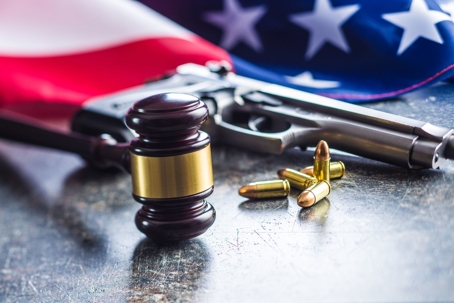North Carolina Law:
Under North Carolina General Statute § 14-415.1, it shall be unlawful for any person who has been convicted of a felony to purchase, own, possess, or have in his custody, care or control any firearm or any weapon of mass death and destruction as defined in G.S. § 14-288.8(c).
Elements:
Under North Carolina law, in order to be found guilty of this Class G Felony, the State must prove beyond a reasonable doubt that a person:
- Has previously been convicted of a felony and
- Purchases,
- Owns,
- Possesses, or
- Has in his or her custody, care, or control
- A firearm or a weapon of mass death and destruction.
What type of punishment am I facing?
Ultimately, if found guilty of the crime above, it will depend on the criminal history of the individual and a number of other factors that a skilled attorney will be able to navigate through. Generally, under North Carolina law, a person who is found guilty of this offense can serve probation, prison time, or even both. A Class G felony carries a maximum of 47 months in prison.
What if I am or was convicted of a felony in another state?
The North Carolina courts have ruled that this crime applies to any felony under North Carolina law and a violation of the criminal law of another state or the United States for an offense substantially similar to a felony and carrying a punishment of more than one-year imprisonment.
What does “firearm” mean in this situation?
A firearm is any weapon, including a starter gun, which will or is designed to or may readily be converted to discharge a projectile by the action of an explosive, or its frame or receiver, or any firearm muffler or firearm silencer. However, this statute does not apply to an antique firearm as defined under North Carolina law. If you are dealing with an antique firearm, pick up the phone and dial the Jetton and Meredith Criminal Defense Team at 704.333.1114.
What does it mean to “possess” a firearm?
Possession of a firearm may be either actual or construction. A person has actual possession of a firearm if the person has it on the person, aware of its presence, and (either alone or together with others) has both the power and intent to control its position or use. Essentially, actual possession requires that a person have physical or personal custody of the item (e.g. hold the gun in his or her hand).
On the other hand, constructive possession of a firearm occurs if the person does not have it on the person but is aware of its presence, and has (either alone or together with others), both the power and intent to control is position or use. For example, North Carolina courts have ruled that a person violated the statute when a person owned a home and defendant was in the home near a firearm. Also, a person was found guilty when they had a key to a premise where certain contraband was located and the person was seen repeatedly coming in and out of where the contraband was found. However, when a person does not have exclusive control of the location where the firearm is found, there must be more than mere association or presence linking the defendant to the item.
If I am convicted of a felony, am I allowed to possess a firearm to protect my home or business?
In the past, the statute was amended in 1995 to impose a lifetime ban on the possession of handguns by convicted felons outside their homes or businesses. In 2004, the statute was amended again to include a ban to all firearms, regardless of the type of length and regardless of where it was possessed. Therefore, the statute includes a lifetime ban that applies to all property, including the defendant’s home and place of business. Remember, regardless of whether the weapon was concealed or not, this statute will apply.
If you or someone you know has been charged with this crime, it is crucially important to contact our Jetton and Meredith Criminal Defense Team at 704.333.1114 before it is too late. Call now for a free consultation.

